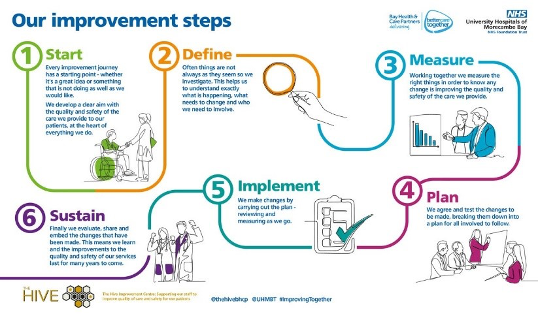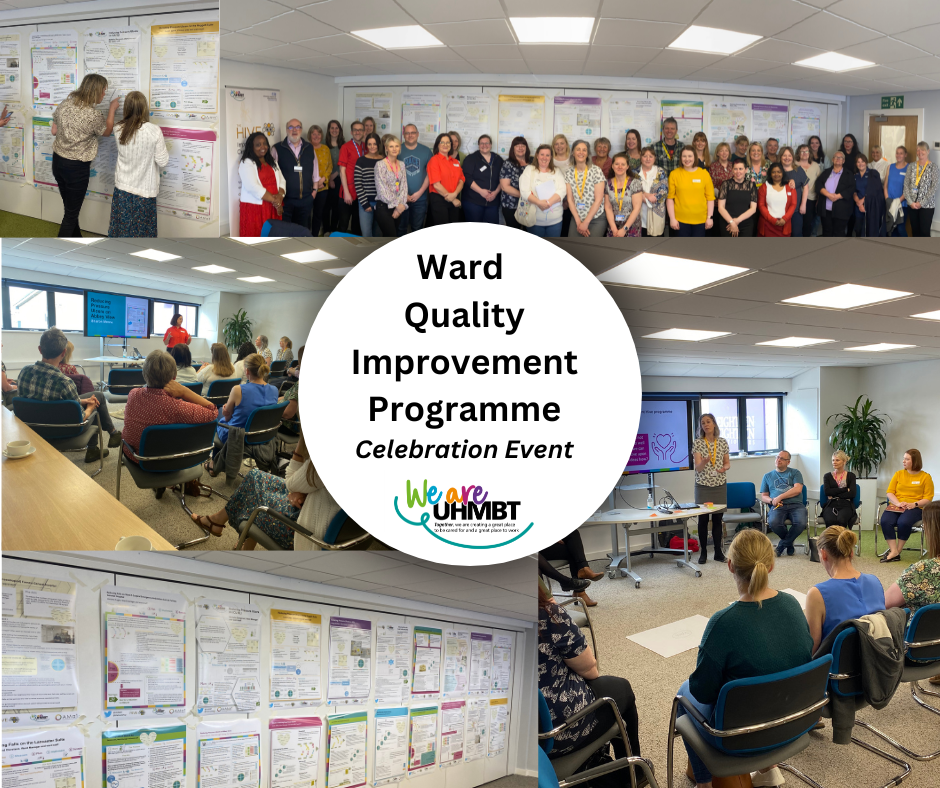Ward Improvement Programme 2022/23
Friday 6 May 2022 saw the first workshop of a brand-new Quality Improvement (QI) training programme. Aimed at making improvements in the Fundamentals of Care on inpatient wards at UHMBT, the programme was developed and delivered by the Quality Improvement Team. Fundamentals of Care is one of the work streams that sits under the Quality and Safety agenda and is important to get right.
The Trust’s QI approach is directly linked to the Trust Strategy, ‘Putting Patients First,’ our Visions and Values, and Leadership Training by putting the emphasis on everyone coming together and taking the opportunity to continuously improve, whether that be large scale improvement projects or small, everyday improvements.
The QI training programme was designed by the Improvement Team to support and coach the ward teams to understand how QI can help to ensure the right improvements are delivered sustainably. The QI training was a tailored version of the Quality Service Improvement and Redesign (QSIR) courses specific to an area of Fundamentals of Care focus: either reducing pressure ulcers or reducing falls.
30 nursing colleagues across the Trust embarked on the exciting programme which was brimming with QI methodology and tools. Participants were split into two waves: one focussing on falls prevention and the other on pressure ulcers. The waves were supported by area leads for falls and pressure ulcers.
The programme followed the Trust’s 6-Steps to Improvement with the workshops focussing in on each step with the opportunity to take the learning and to use QI tools practically on their wards. The tools were very valuable to the teams in applying their learning and each ward had a dedicated QI Coach from the Improvement Team to support them in using the tools and their newly gained QI knowledge between the workshops.

The programme was split into two. The first half of the programme focussed on getting the data right. Participants dived in using fishbone diagrams to start to understand the factors involved in the problem of poor data quality. This was followed by process mapping the current state (what happens now) which started with the discovery of a patient fall or pressure ulcer through to the incident report being reviewed, validated and closed; followed by reviewing & analysing the current state and mapping a future state process. The outcome of this work was then actioned by the relevant area leads.
The second part of the training programme started in September 2022 and shifted focus from improving data to making tangible quality improvements on the wards in both falls and pressure ulcers. Plan, Do, Study, Act (PDSA) test cycles were undertaken as part of the application of learning and improvement boards on the wards were an integral tool used to support the improvements.
The PDSA approach highlights the importance of the planning stage, we have all faced pressure for ‘results now’ and it’s easy to dive in to making changes. But proper planning saves time in the long run., and this was an important concept to highlight in the programme.
Some reflections at the end of the course included that although it had often been difficult to give the time needed to the project, the benefits from putting the time and energy into reducing the number of falls, was not only better for patients, but also reduced workload in the long run by not having to investigate as many incidents. Feedback on the QI coaching element between workshops was also very positive and everyone found it very valuable.
All those involved in the QI Training programme shared and celebrated their achievements and learning at an event in May 2023. This was a chance to reflect on improvements and share the work undertaken, along with outcomes and learning achieved with presentations and posters.
There were some positive outcomes with some wards reducing falls by 37% and pressure ulcers by 36%! But, of course, not all wards had great success, but that’s ok, we can learn from this – and the work around pressure ulcers and falls, and other elements of the Fundamentals of Care, will always continue, as we can never stop improving how we care for our patients.
So, what next for the nursing teams? Well, the Corporate Nursing Team urge the ward managers and matrons to:
- Feel empowered to deliver improvements, using the skills and tools they have learned from the Wards QI Improvement Programme.
- Learn from what goes well and not so well - not being afraid to test changes, and to
- Share the lessons
The Improvement Team University Hospitals of Morecambe Bay (UHMB) contact [email protected]

